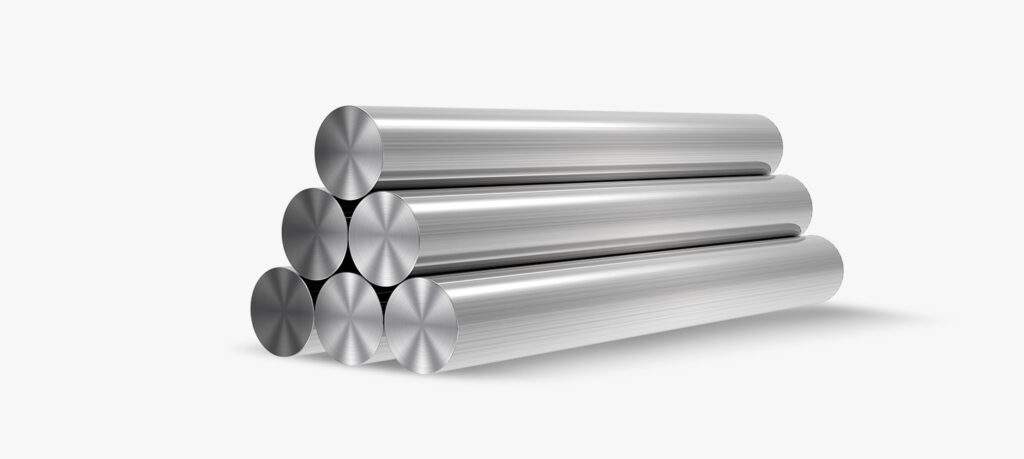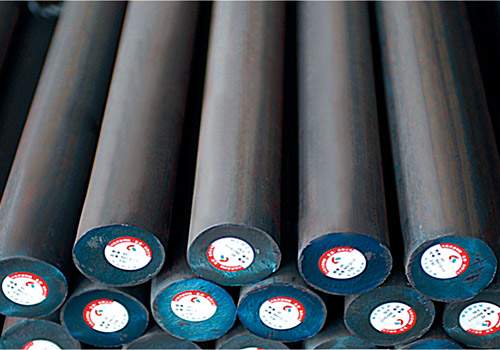
Understanding the Different Types of Round Metal Bars
Table of Contents
Introduction
Metal fabrication and construction industries rely heavily on the strength and versatility of round metal bars. These cylindrical metal rods, also known as round bars, are the backbone of many structural applications, from architectural support to mechanical components. The round metal bar’s uniform cross-section and circular geometry make it a popular choice for various engineering needs. This comprehensive guide will explore the different types of round metal bars, their properties, applications, and how to select the right one for your project.
Understanding Round Metal Bars

Definition and Overview
A round metal bar is a solid, cylindrical metal rod with circular cross-section. They are produced in various metals, including steel, aluminum, brass, and copper, each with unique properties that make them suitable for different applications.
Properties of Round Metal Bars
- Strength: The strength of a round metal bar depends on the material and its manufacturing process.
- Ductility: The ability to bend without breaking, which varies among different metals.
- Hardness: Resistance to deformation, which can be altered through heat treatment processes.
- Corrosion Resistance: The ability to resist rust and corrosion, which is material-dependent.
Manufacturing Process
Round metal bars are typically manufactured using three primary methods: hot rolling, cold drawing, and forging. Each of these processes uniquely influences the final properties of the metal bars, including aspects such as surface finish, dimensional tolerance, and overall mechanical characteristics. The choice of production method can significantly affect how the bars perform in their intended applications, making it essential to understand the implications of each process. For example, hot rolling may achieve different surface finishes and tolerances compared to cold drawing or forging, which can, in turn, impact the durability and functionality of the final product. Understanding these variations is crucial for ensuring the round metal bars meet specific requirements for various industrial uses.
Types of Round Metal Bars
Steel Round Bars
- Carbon Steel: General-purpose steel with good strength and weldability.
- Alloy Steel: Enhanced properties through the addition of alloying elements like chromium, molybdenum, or nickel.
- Stainless Steel: Corrosion resistance due to high chromium content.
Non-Ferrous Round Bars
- Aluminum: Lightweight with good corrosion resistance and electrical conductivity.
- Copper: Excellent thermal and electrical conductivity, used in electrical wiring.
- Brass: An alloy of copper and zinc, known for its malleability and corrosion resistance.
- Bronze: An alloy of copper and tin, used for its strength and corrosion resistance.
Specialty Round Bars
- Tool Steel: High carbon and alloy steels used for making tools and dies.
- Maraging Steel: Known for its ultra-high strength and toughness.
- Inconel: A nickel-chromium alloy used for high-temperature applications.
Applications of Round Metal Bars
Construction and Architecture
Round metal bars are used in structural applications, such as rebar in concrete and structural support beams.
Automotive and Aerospace
They are used in the manufacturing of vehicle components, aircraft engines, and other high-stress parts.
Mechanical and Industrial Equipment
Round bars are essential in the production of gears, shafts, and other mechanical components.
Electrical and Electronics
Copper and aluminum round bars are used for electrical wiring and cable conductors.
Technical Specifications and Comparison
| Material | Tensile Strength (MPa) | Yield Strength (MPa) | Hardness (BHN) | Corrosion Resistance | Density (g/cm³) | Applications |
|---|---|---|---|---|---|---|
| Carbon Steel | 400-600 | 200-400 | 120-250 | Low | 7.85 | General construction |
| Stainless Steel | 200-550 | 100-300 | 130-230 | High | 7.90 | Food processing, medical |
| Aluminum | 90-470 | 20-120 | 30-90 | High | 2.70 | Aerospace, lightweight structs |
| Brass | 220-540 | 110-340 | 40-100 | Moderate | 8.40-8.70 | Plumbing, electrical contacts |
| Copper | 220-280 | 100-110 | 60-100 | Very High | 8.96 | Electrical wiring |
Maintenance and Best Practices

Storage
It is essential to store round metal bars in a location that is both dry and clean. This precaution is important to effectively prevent the onset of rust and corrosion, which can significantly compromise the integrity and longevity of the metal. By ensuring that the storage environment is free from excessive moisture and dirt, you can help maintain the quality and durability of the metal bars over time.
Inspection
Regular inspection for surface defects, such as cracks or scale, is essential for maintaining the integrity of the bars.
Machining
When machining round metal bars, use appropriate cutting tools and lubricants to achieve the desired finish and tolerances.
Heat Treatment
Some round metal bars may require heat treatment to achieve desired mechanical properties.
Conclusion
Round metal rods are versatile and essential components in a wide range of industries. Understanding the different types, their properties, and applications is crucial for selecting the right material for your specific needs. This guide has provided a comprehensive overview of round metal rods, ensuring that you have the knowledge to make informed decisions in your projects.
FAQ
What are the main differences between round metal rods made from different materials?
The main differences lie in their strength, ductility, hardness, and corrosion resistance, which are determined by the material’s composition and manufacturing process.
How do I choose the right round metal rod for my application?
Consider the required strength, weight, corrosion resistance, and cost of the material. Consult with a materials engineer or use a materials selection guide.
Can round metal rods be customized to specific lengths or diameters?
Yes, round metal rods can be cut and machined to specific lengths and diameters to meet the requirements of a particular project.
What are the common surface finishes for round metal rods?
Common surface finishes include mill finish, bright drawn, and ground and polished, depending on the application and material.
How do I maintain the quality of round metal rods over time?
Proper storage, regular inspection, and timely maintenance can help preserve the quality and extend the life of round metal rods.






